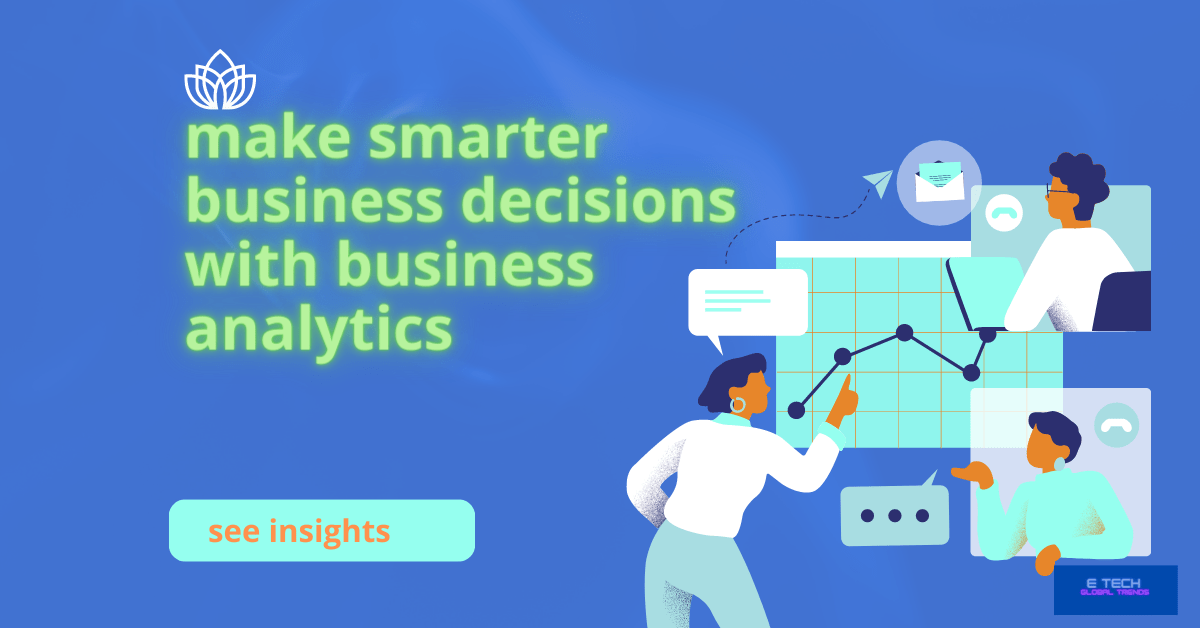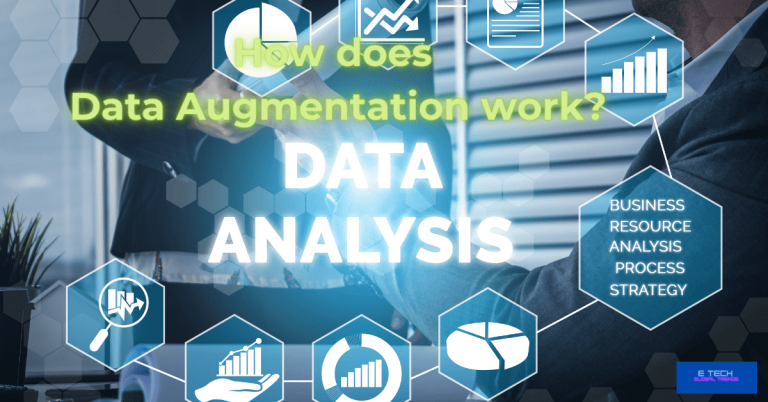Business Analytics
The need for qualified individuals in the field of business analytics is expanding quickly each year. Due to this, a lot of college students and working adults are thinking about earning a Business Analytics, (BA )degree.
People who use business analytics are called analysts. The job of the business analyzer is to support the company and use data to solve various issues. All of the data will examine by these business analysts, who will then evaluate it in light of their standards in order to identify the critical variables. To come up with solutions for the company, they talk about all management levels. In terms of the job’s breadth, there is a lot of room for growth. They have a crucial position in businesses that rely on data.
What is business analytics?
BA is essentially about applying quantitative methods to make the best business decisions while learning crucial information about how businesses operate. Online courses are your greatest bet for learning about business analytics, To meet your preferences and interests, it provides a range of analytics-based courses.
Business analytics includes analyzing historical data to make forecasts and decisions about the future. A corporation should hire a qualified business analyst to make better business judgments.
Business analytics isn’t rocket science, but it does demand analytical abilities, a solid understanding of statistics, and the ability to solve problems and make decisions.
In addition to this, one needs to be well-versed in a few technical skills.
What are the technical skills of a BA person?
- A business analyst must be able to comprehend the technology underlying a system, platform, or product.
- They will also require in-depth database expertise.
- They should have the ability to communicate difficult ideas simply.
- Working understanding of the organization’s technological stack is a crucial ability for business analysts to possess.
What additional competencies do business analysts require beyond technical ones?
getting hands-on experience through internships and training suited to your business. Due to the complexity of the issues covered in business analytics courses, there is a need for experts who can serve as bridges, mediators, & facilitators between both the business and IT sectors.
To bridge the gap across business and IT, it’s critical to stay current with the latest software and programming languages.
You must develop the abilities of resilience, leadership, communication, & teamwork even if the corporate climate of today is predominantly centered on digital technology.
What are the components of Business Analytics?
1.0 Data warehousing
A business analyst must be familiar with the many types of data warehouses, as well as their architecture and applications for managing, storing, and retrieving data.
2.0 Data modeling
As a business analyst, you have to familiar with the many data models that utilize in the field and how they may use to develop and evaluate business objectives.
2.0 Data Mining
Data mining techniques must be understood by business analysts in order to effectively extract useful information from massive data sets.
5.0 Tools for Visualization
A business analyst must be knowledgeable with visualization technologies like Tableau, Power BI, & QlikView. These are applied to data visualization in reports and dashboards.
6.0 Project management
Some management techniques that guarantee projects are delivered on schedule and on budget include Agile, Scrum, and Waterfall. Knowing these methods is essential for a business analyst.
7.0 Modeling business processes
The modeling of business processes and the detection of potential areas for improvement may be done using technologies like BPMN, BPEL, and BPMN2.
8.0 UML
For modeling software systems and corresponding with developers, the Unified Modeling Language, or UML, is crucial.
9.0 SQL
To draw insightful conclusions from the data stored in databases, one needs to have a solid grasp of SQL- which stands for Structured Query Language.
What distinguishes a business analyst from a data scientist from a business intelligence analyst from a business systems analyst?
Even though many individuals are unclear about these occupations and their nature, these industries have experienced significant development. Let’s check how these vocations vary from one another.
1. business analyst
Through the use of data analysis, the business analyst aids an organization in making choices. These experts assist in making choices that immediately affect the expansion of goods and services as well as the efficiency of operations.
2. Data Scientist
Using their tools and methods, the data analyst gathers the raw data & transforms it into a usable data resource. Data analysts are mainly concerned with reporting to decision-makers and stakeholders, as well as with data analysis and visualization.
3. Data Scientist
Data scientists are professionals in analysis who manage data and look for patterns using their technological and industrial skills.
They make use of their contextual awareness and industry experience to identify undiscovered answers to business difficulties and make assumptions about where they could be.
4. Business Systems Analyst
These business system analysts assist the organization by applying their understanding of business computer technology, much like computer system analysts do. They assist the business by boosting technical aspects and installing tools to speed up work, which increases efficiency for the business.
5. Business Ssystem Analyst
By mining the whole data of the organization using their software, these business intelligence experts get the data in various formats. They utilize this information to examine the business’s overall macrocosm.
How does BA impact business growth?
This explanation comes with a manner of successful business administration. Not by the leaning manner.
Making better decisions and resolving company issues may accomplish with the help of business analytics. Businesses may acquire important insights that can aid them in developing successful strategies and better-informed decisions by analyzing data and spotting trends and patterns.
Inefficiencies and potential improvement areas inside a company can be found using business analytics.
Additionally, it may use to forecast future patterns and results, which is beneficial for planning. Business analytics may also use to spot fraud and guard against possible losses.
Overall, how business analytics are employing mostly and the caliber of the data being examined determine how effective they are.
To maximize the benefits of their business analytics initiatives, firms must have a solid grasp of their data and know how to analyze it successfully. corporate analytics may be a potent instrument for achieving corporate success with the appropriate methods, skills, and resources.
Business analytics refers to the use of;
- information technology to analyze the causes, impacts,
- effectiveness of an organization’s interactions with its external environment in management, marketing, and
- industrial contexts.
Business analytics is the use of sophisticated quantitative methods to learn important information about how businesses function.
To enhance real-time decision-making, it also takes a wider perspective of actual management of performance approaches mixed with business intelligence strategies & contextual data analysis methods.
Why do we need business analytics?
The following are some advantages of BA in breif:
- greater decision-making
- improved comprehension of consumer requirements
- More informed programs, policies, judgments, and services
- A rise in productivity
What are the differences between business analytics and marketing?
A good question!
They look like same. But it is not.
The two independent fields of business analytics and marketing are essential to today’s data-driven decision-making. This section will give an introduction to both disciplines and emphasize how crucial analytics are for directing strategic business decisions.
Then,
What is marketing analytics?
The technique of gathering, examining, and interpreting data pertaining to marketing operations is referred to as marketing analytics.
To learn more about;
- consumer behavior,
- market trends, &
- the success of marketing efforts,
- it makes use of a variety of quantitative and qualitative methodologies.
- Optimizing marketing tactics and
- raising overall corporate performance is the ultimate goal of marketing analytics.
While Business Analytics means…
The process of employing
- statistical tools and data analysis techniques to study historical business performance,
- spot trends, and
- provide useful insights.
- It includes a wider range of data analysis techniques, including supply chain analysis, operations analysis, financial accounting, and more.
The goals of business analytics are to improve operational efficiency, promote informed decision-making, and accomplish corporate objectives.
The value of analytics on decision-making:
Decision-making in all sectors now heavily relies on analytics. Businesses may find opportunities, reduce risks, and enhance their operations by utilizing data and applying analytical approaches.
With the use of analytics, businesses can stop making decisions based on gut feelings and start using data-driven insights, which boosts their competitiveness and profitability.
1. An important discussion on business analytics’ goals
Business analytics aims to increase operational effectiveness while also identifying cost-saving possibilities, market trends, performance forecasts, hazards, and possibilities, and aiding strategic decision-making.
2. Comparison of the two disciplines’ objectives
corporate analytics attempts to enhance overall corporate performance, operational effectiveness, & strategic planning whereas marketing analytics generally concentrates on boosting marketing strategies & customer-centric activities.
3. Examining the goals of marketing analytics
Understanding consumer behavior, improving customer segmentation, optimizing marketing campaigns, calculating marketing ROI, and improving the retention and acquisition of customers tactics are all goals of marketing analytics.
So, now you know how BA will ultimately prove to be more successful than marketing analytics.
What is the trend in 2023?
Are they different from previous explanations?
Well, yes it is. Due to new introductions of uses.
How does it happen?
BA has experienced significant growth, and the field’s future prospects are quite bright. As more firms come to understand the benefits of data-driven decision-making, there is an increasing need for qualified business analysts.
Businesses from a variety of industries will use data analytics more and more in 2023 to gather insights, streamline workflows, and support strategic goals.
BA assists firms in making sense of massive volumes of data and obtaining insightful knowledge that may enhance productivity, save costs, and enhance customer experiences.
What are the BA insights?
Predictive analytics is one sector in that business analytics is anticipated to make a substantial difference. Businesses may predict future trends, consumer behavior, & market dynamics by using sophisticated statistical models & machine learning algorithms.
Consequently, businesses are able to take preventive actions and maintain an edge over rivals.
Additionally, this is developing to embrace cutting-edge technology like automation and artificial intelligence.
There is a rising need for devices and processes that can handle and analyze data effectively as organizations produce more data than at any time before.
In order to help organizations gain insights more quickly, AI-powered analytics applications are being created to;
- pattern detection,
- automate data preparation and
- predictive modeling.
To sum up,
business analytics will have a huge future in 2023.
There is a considerable need for qualified individuals who can successfully analyze and understand data to support corporate growth given the increasing relevance of data-driven decision-making & the rising usage of sophisticated analytics technology.
Therefore, if you have an interest in business analytics, this is a wonderful moment to start and take advantage of the chances that lie ahead.
Summary
Business analysts possess a broad variety of technical skills in the areas of research, technology, big data analysis, statistical analysis, planning for funding, organization, and documentation. They must develop decision-making, problem-solving, negotiating, management, and communication abilities on a personal level.
Business practices are examined, evaluated, and areas for improvement are found by this business analyst. They research and examine updated business practices, analyze them, and present their conclusions and recommendations.
Hope this effort will help!
Read more on related topics business management software , business intelligence software








Simply wish to say your article is as amazing. The clearness in your post is just nice and i could assume you’re an expert on this subject. Well with your permission let me to grab your feed to keep updated with forthcoming post. Thanks a million and please carry on the gratifying work.